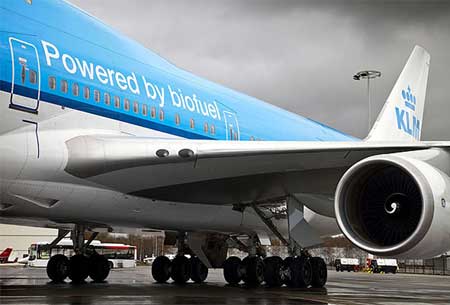 |
|
KLM Royal Dutch Airlines operated its first ever passenger flight powered by sustainable biokerosene on Nov.24, 2009.(Agencies) |
|
Dutch airline KLM plans to use recycled cooking oil as biofuel to power flights to and from France in a move aimed at cutting carbon emissions. Starting in September, KLM will begin more than 200 flights between Paris and Amsterdam using biofuel made from used cooking oil, the company said Wednesday. KLM managing director Camiel Eurlings said in a statement the airline does not have to make any changes to its aircraft engines to use the new biofuel. The biofuel flights are intended to help reduce KLM's carbon emissions while having a "minimum negative impact on biodiversity and food supply." Air travel is responsible for about 3 percent of greenhouse gases, but their share of global emissions is rising rapidly. The European Union told airlines earlier this year they would have to cut their carbon emissions by three percent on flights to the continent in 2012 to fall within new pollution limits. The limit is designed to encourage airlines to reduce greenhouse gases that contribute to global warming by switching to cleaner fuels or economizing on fuel consumption with lighter aircraft or more efficient flight patterns. Eurlings said he expects authorization to be granted soon for KLM's flights using the new fuel. An Air France-KLM Boeing 747 using a 50 per cent biofuel mix in one engine successfully completed a demonstration flight in the Netherlands in November 2009. Forty people flew on the 90-minute trip, including the Dutch economic affairs minister, and the airlines said it was the first flight using biofuel to carry passengers. The plane had a 50-50 mix of biofuel and regular jet fuel in one of its four engines. Virgin, Air New Zealand, Air Japan and Continental Airlines have previously completed similar demonstration flights using biofuel mixes. (Read by Nelly Min. Nelly Min is a journalist at the China Daily Website.) (Agencies)
|
荷蘭航空公司計劃使用回收利用的“地溝油”作為生物燃料,為荷蘭至法國的往返航班提供動力,以減少碳排放。 荷航本周三稱,從今年九月起,將啟用200多架使用“地溝油”提煉生物燃料的客機,往返于阿姆斯特丹和巴黎兩地。 荷航總經(jīng)理卡米爾?厄爾林斯在聲明中稱,使用這種新型生物燃料時,不需要改造飛機發(fā)動機。使用生物燃料的航班可以減少荷航的碳排放,同時“對生物多樣性和糧食供應(yīng)也幾乎沒有負(fù)面影響。” 航空業(yè)的碳排放量占到總排放量的3%,但這一比例正迅速增長。 歐盟今年早些時候告知各航空公司,飛往歐洲大陸的航班在2012年碳排放需減少3%,以達(dá)到新的污染排放限額。 該限額旨在鼓勵航空公司減少導(dǎo)致全球變暖的溫室氣體排放,轉(zhuǎn)而使用更清潔的能源,或使用輕型客機以及更高效的飛行模式,以節(jié)約能源消耗。 厄爾林斯表示,他希望相關(guān)部門盡快正式授權(quán)荷航使用生物燃料。 2009年11月,法航荷航集團(tuán)的一架波音747客機曾在一個發(fā)動機中混入50%的生物燃料,并在荷蘭成功完成了示范飛行。 40人乘坐了這架客機,包括荷蘭經(jīng)濟事務(wù)大臣。飛行持續(xù)90分鐘。荷航表示,這是首次在客機中使用生物燃料。在飛機的一個引擎中,生物燃料和普通航油各占一半。這架飛機共有四個引擎。 維珍航空、新西蘭航空、日本航空、美國大陸航空此前就已使用生物混合燃料進(jìn)行了類似的示范飛行。 相關(guān)閱讀 駱駝過多成負(fù)擔(dān) 澳議員呼吁“殺駱駝救地球” (中國日報網(wǎng)英語點津 Julie 編輯: 馮明惠) |
|
Vocabulary: economize: to limit or reduce (expense, waste, etc)(節(jié)約,節(jié)省,有效地利用) |
